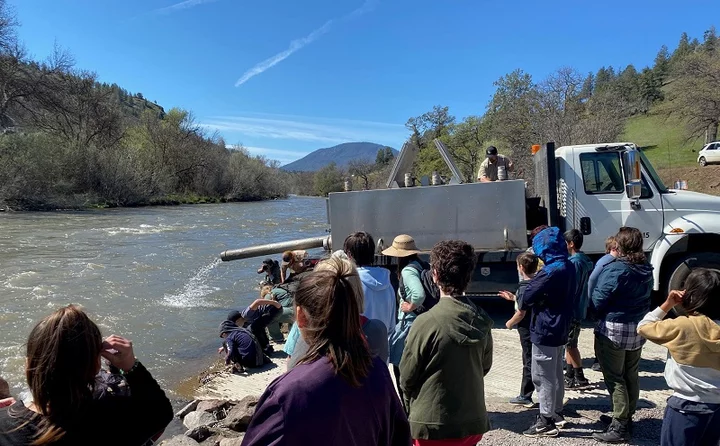Image via California Department of Fish and Wildlife
###
Press release from the California Department of Fish and Wildlife:
The California Department of Fish and Wildlife (CDFW) this week successfully released approximately 500,000 juvenile salmon into the Klamath River just below the Iron Gate Dam.
On Tuesday, April 16, joined by leaders from the Karuk, Yurok, Shasta Indian Nation and the Quartz Valley Indian tribes, CDFW released about 90,000 yearling coho salmon. It was the first major release of coho salmon, a state and federally listed threatened species, into the Klamath River since dam removal began in earnest late last year.
The fish were trucked about 7 miles from CDFW’s new, state-of-the-art Fall Creek Fish Hatchery in Siskiyou County and released following remarks and a Tribal blessing.
“We’re all here for the same reason. We’re all here to pray for these fish to make it and to see justice for our people down river,” said Kenneth Brink, Vice Chairman of the Karuk Tribe. “It’s a different time we are living in now. Our kids no longer have to see our river die. We are watching our river heal now. It’s a great time.”
“These baby fish represent hope,” said Yurok Tribal Council Member Phillip Williams. “The Klamath was mistreated for more than a century, but now the river is healing and so are we. Through dam removal, habitat restoration and hatchery augmentation, we are building a brighter future for the next generations.”
Jason Roberts, Inland Fisheries Program Manager for CDFW’s Northern Region, said, “These will be the first fish from the hatchery that will come back to a free-flowing Klamath River. They will help repopulate the newly opened habitat above the dams and provide us with brood stock for future years of coho releases.”
The following day, April 17, CDFW released more than 400,000 fall-run Chinook salmon fry from the same location below Iron Gate.
The coho and Chinook salmon released this week are expected to return to an undammed Klamath River in two to four years after life in the Pacific Ocean with access to hundreds of miles of new spawning and rearing habitat as a result of dam removal.
Roberts said river conditions were ideal for the salmon releases this week with water temperatures at 51 degrees, high dissolved oxygen levels and low turbidity.
In the two weeks prior to release, CDFW further tested river conditions by placing “sentinel” juvenile salmon in holding enclosures for 48 hours at various locations in the Klamath River. All 200 salmon in the sentinel study survived showing no ill effects from their time in the river.
Later this spring, CDFW will release about 1.75 million fall-run Chinook salmon smolts into the river. CDFW varies the ages of the fish and release strategies to improve survival. All future salmon releases will take place below Iron Gate until dam removal is complete. The Iron Gate Dam is scheduled for removal later this year.

CLICK TO MANAGE